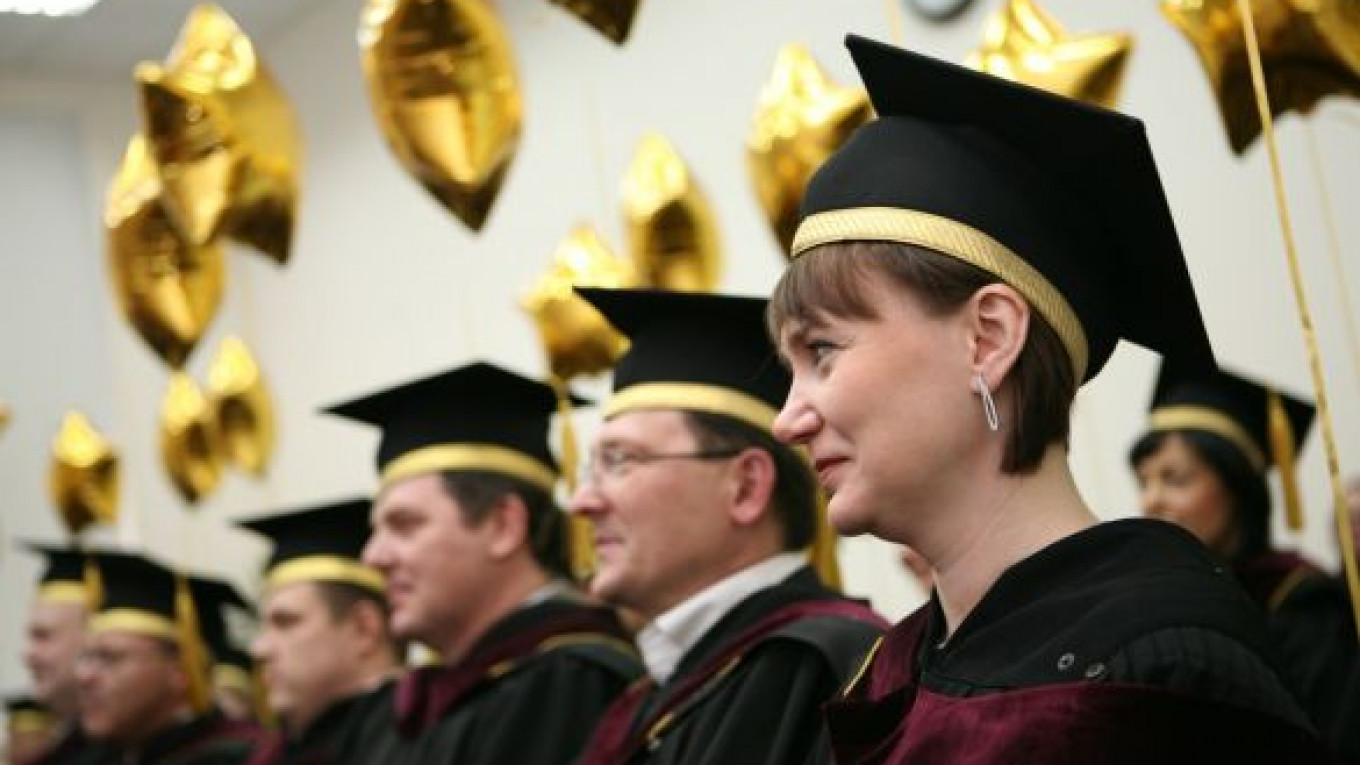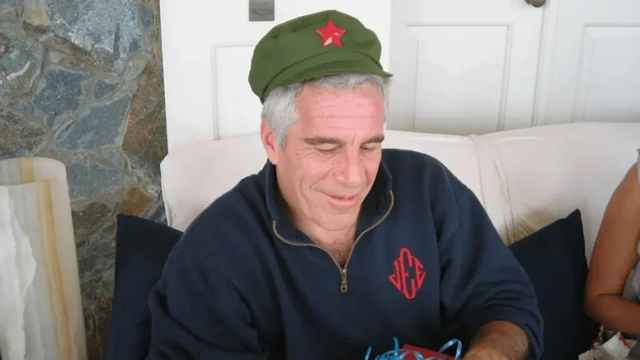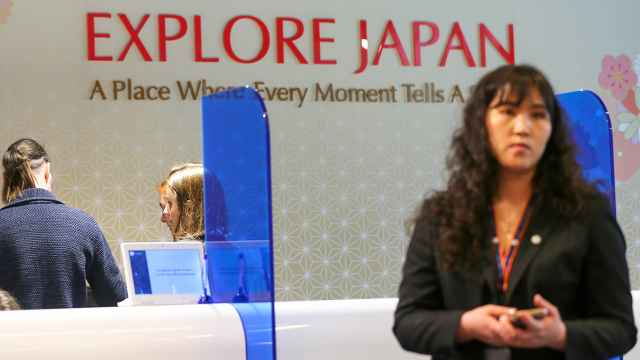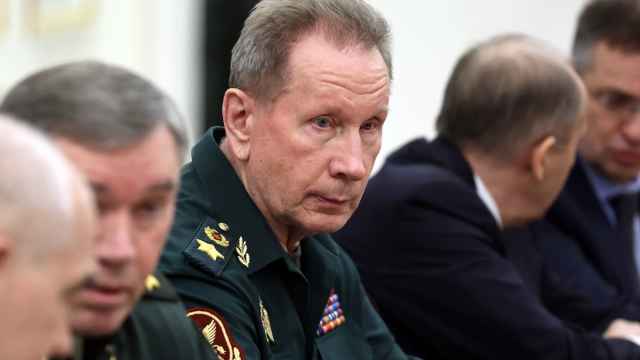The demand for business education within Russia is far from where it was before the global financial crisis: Students are requesting both the most expensive and the cheapest, shortest programs. This trend will cause the business education market to consolidate, analysts said.
The highest and lowest segments of the market, or programs with price tags of more than 1 million rubles ($32,000) and less than 300,000 rubles ($9,700), are growing the most successfully, said Sergei Myasoyedov, president of the Russian Association for Business Education, or RABO.
Following on the heels of the financial crisis, the business education market had its own downturn. That came after several years of high demand for programs of any quality or length, when about 2,500 people were entering B-school in Russia each year. With most programs consisting of two years, that meant about 5,000 people were in business programs at any given time.
A $132,000 Price Tag
But an outflow of potential business school students began in spring 2009 and continued into 2010. The first group that exited consisted of students whose companies were paying or promising to pay for the education. In fact, according to estimates from education marketing firm Begin Group, the business education market shrank by roughly half.
Freezing prices didn't save the situation for the schools, and lowering the price tag for business programs, as a handful of schools did, also failed to turn the tide.
Yet, student interest in the two most expensive programs in Russia has remained. Just last month, the Skolkovo School of Management launched an Executive MBA, or EMBA, program — or master's program for businesspeople near or at the top ranks of their companies — that is conducted in Russian with simultaneous translation from English.
Forty-five people paid 95,000 euros ($132,000) for that offering — a record price for business education in Russia. In fact, Skolkovo had introduced the first English-language program, with a price tag of 90,000 euros, in 2009. This January, the fourth class for that program had 24 students, who also paid 90,000 euros. Skolkovo, which is an institution separate from the innovation hub of the same name, is enrolling its fifth such class.
The second most expensive program is the dual-degree EMBA offered by St. Petersburg State University's Higher School of Management and HEC Paris for 51,900 euros. Enrollment for that program wraps up in November. The previous group of 17 students began its studies in January. This year, demand among applicants is expected to be roughly similar.
Sergei Kalendzhyan, dean of the Higher School of Commercial Management in the Russian Academy for Domestic Economy and Government Service, said demand for business education has already reached its nadir. That suggests the market is now on an upward curve.
This year, Kalendzhyan's institution, known as VShKU, has enrolled 250 students, or just a dozen shy of the 2008 enrollment. Demand is gradually recovering, Kalendzhyan believes.
Management of Expectations
Students registering in this post-financial-crisis period are requesting more from their programs: They want offerings that meet their individual needs in terms of what topics are offered and how teaching is conducted.
VShKU runs an EMBA program for supervisors and managers and, separately, a program for business owners. This year the school started an MBA program that runs on weekends, and two sets of students are enrolled in the weekend MBA program and the Institute for Business and Business Administration, or IBDA, while yet another group studies in the Russian Academy for Domestic Economy's business school.The Moscow International School of Business, or Mirbis, also is broadening its offerings as it tries to attract the widest possible group of students. Mirbis now has every type of business education program available at other schools in Russia — and does so in various formats and has 16 areas of specialization.
That makes it possible for Mirbis to increase its student enrollment even more, said Yekaterina Lisitsyna, MBA department director at Mirbis. In 2008, in the MBA and EMBA programs, there were 447 students, and the school is expecting 575 enrollees for the whole of 2011.
The hit of the academic season, however, is an abridged business education program that runs for a year, said Dmitry Pavlov, director of development and external communications for St. Petersburg International Institute of Management. This month, IMISP started offering one such program, in which 90 percent of students are paying the bill entirely or partially by themselves.
That number attests to the fact that it is difficult to get your company to pay for business education, as they once did, Pavlov concluded. What's more, students who pay for their business education themselves tend to start off with a couple of trial programs that run less than a year. At IMISP, there were 770 students in these types of programs for the 2007-08 academic year, and that figure rose to about 880 for 2010-11.
In the previous academic year, the enrollment in such programs either rose or reached a stable level at the National Research University in the Higher School of Economics; the business schools at the federal government's financial universities; and other higher education institutions. This type of program also was opened at IBDA.
Modules, Master's Degrees
Anastasia Korshunova, director of marketing and sales for Vlerick Leuven Gent Management School in Russia, said short-term programs of 18 months or less, as well as module MBA programs, are taking advantage of this demand, since these briefer programs make it possible to combine professional activities with graduate studies.
Vlerick Leuven Gent has introduced to the market a modular, 18-month EMBA program in Brussels. Before that came into existence, there was only a two-year program with evening classes. Interest is continuing in the module EMBA programs in St. Petersburg — they cost 23,000 euros — with about 20 to 25 students. By comparison, there were about 40 students in 2008.
Myasoyedov, the RABO president who is also the first provost of Russian Academy for Domestic Economy, said the market for master's degrees in management is growing for reasons similar to those fueling growth at the low and high ends of the market.
Twelve master-level management programs have appeared in Russia so far, but demand for such degrees is rising, especially because the majority of these programs have enrollment slots for which the federal government picks up the entire cost of the program for the student.
The Higher School of Management at St. Petersburg State University increased its enrollment for management master's degrees from 77 people in 2008 to 123 in 2011. Mirbis, which doesn't have any of these special federally funded slots at all, grew its management master's ranks from 67 to 100 students during the same period.
A Message from The Moscow Times:
Dear readers,
We are facing unprecedented challenges. Russia's Prosecutor General's Office has designated The Moscow Times as an "undesirable" organization, criminalizing our work and putting our staff at risk of prosecution. This follows our earlier unjust labeling as a "foreign agent."
These actions are direct attempts to silence independent journalism in Russia. The authorities claim our work "discredits the decisions of the Russian leadership." We see things differently: we strive to provide accurate, unbiased reporting on Russia.
We, the journalists of The Moscow Times, refuse to be silenced. But to continue our work, we need your help.
Your support, no matter how small, makes a world of difference. If you can, please support us monthly starting from just $2. It's quick to set up, and every contribution makes a significant impact.
By supporting The Moscow Times, you're defending open, independent journalism in the face of repression. Thank you for standing with us.
Remind me later.






